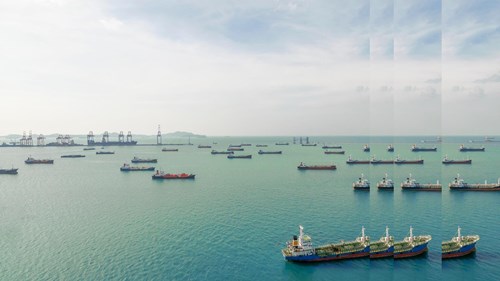EU financial sanctions: Bundesbank updates its FAQs
Financial sanctions are severe restrictions on foreign trade. The freezing of existing assets and the ban on providing new assets amount to an almost complete ban on capital and payment transactions with listed natural or legal persons. Compliance with the financial sanctions, which are frequently subject to criminal penalties or fines in any case, is a major challenge not only for companies operating in the financial sector.
Germany’s Bundesbank therefore publishes a host of information on its website on interpreting and applying the relevant financial sanctions. Although financial sanctions are mainly a matter of European Union law, the Bundesbank as the national authority is responsible for implementing them in Germany, as EU law is enforced indirectly. In particular, the Bundesbank publishes a list of frequently asked questions (FAQs) on financial sanctions, along with the corresponding answers. FAQs have long been a common way of providing information online and have also become increasingly popular among the public authorities. Although the Bundesbank’s FAQs are not legally binding, they are an important indicator of the Bundesbank’s actual administrative practice and the underlying legal views. However, companies operating throughout Europe should not rely on the Bundesbank’s FAQs without further consideration. This is because the legal views of the Bundesbank do not always tally with those of the European Commission or the sanctions authorities of other EU Member States.
The following points from the Bundesbank’s FAQs on financial sanctions, updated in May 2025, stand out in practical terms:
Money transfers are often channelled through several countries before being credited to the recipient account. In such cases, the question has previously arisen in sanctions law as to whether, if the transfer of frozen funds is authorised by the competent sanctions authority of another EU Member State, further authorisation must be obtained from the Bundesbank before the funds are transferred or credited in Germany. In accordance with the principle of mutual recognition under EU law, it appeared obvious to conclude that further authorisations within the EU were not necessary.
This has now been confirmed by the Bundesbank. Frozen funds are released upon the authorisation of the competent authority of an EU Member State to the extent of the authorisation. No further authorisations by the competent authorities of other Member States are required for transferring or crediting those funds to the recipient account, in the Bundesbank’s legal opinion.
Control by listed persons over non-listed companies and indirect provision of assets
The freezing of assets belonging to listed persons and the prohibition on providing assets to listed persons are targeted sanctions. In the Bundesbank’s opinion, these financial sanctions therefore only apply to those persons and organisations listed in the relevant legal acts (known as the listing principle).
According to the Bundesbank, if a listed person has majority ownership of a non-sanctioned company with its own legal personality, that does “not automatically” mean the company’s funds are frozen. The Bundesbank thus differs from the European Commission’s legal opinion, which states that a listed person’s ownership of or control over a non-listed company generally also leads to control over the company’s assets. According to the relevant provisions of EU sanctions law, only funds that are either in a listed person’s ownership or possession or held or controlled by a listed person are to be frozen. However, in the Bundesbank’s view, the fact that a listed person can exert influence over the management of a non-listed company through their (majority) ownership does not automatically mean that the listed person has control over the assets of the non-listed company. The Bundesbank states that this applies in particular if the management of the non-listed company is governed by EU law. Due to its obligation to comply with EU law, the company management would be liable for prosecution if it allowed the listed majority owner to access the company’s assets.
The Bundesbank requires that a listed majority shareholder’s control over the assets of the non-listed company be determined positively. According to its view, which has been expressly agreed with the German government, such control requires the listed shareholder to have exercised its influence in a way that gives it “the ‘keys to the company safe’”. A listed majority shareholder must have (its own) power of disposal over the assets of the non-listed company. In addition, if there is a “special relationship of proximity or trust between the decision makers of the non-listed company and a listed person [...], for example due to a family relationship or economic dependence” and/or the non-listed company has the status of a pure holding company, this could also suggest control.
However, the fact that a listed person has a management role or is a beneficial owner in a non-listed company is not sufficient for that person to have control over the company’s assets. Control can only be assumed if the listed person “can ‘act’ unhindered […] within the company”. If the non-listed company has its registered office outside the European Union or is managed by persons not resident in the territory of the European Union, the Bundesbank states that the requirements for control of the assets by a listed person are less stringent. This is because there is no risk of criminal liability resulting from the obligation to comply with EU law.
Similar considerations apply to the provision of assets to non-listed companies which are majority-owned by a listed person. The prohibition on providing funds also prohibits the indirect provision of funds to listed persons. However, it cannot simply be assumed that a payment to unlisted companies leads to the funds being passed on to the listed majority owner and thus constitutes indirect provision. In the case of companies with their registered office and management in the EU, which are bound by the criminal prohibition on providing funds, the Bundesbank thinks there are some fairly important arguments against the forwarding of funds and consequently against an indirect prohibition on providing funds. In the European Commission’s opinion, however, precisely the opposite presumption applies, namely that payments to unlisted companies are generally passed on to their listed majority owner or benefit the latter.
Adding up listed persons’ ownership shares
Furthermore, in its updated FAQs, the Bundesbank agrees with the legal opinion of the Council and the European Commission, which states that the ownership shares of various listed persons are to be added up when determining whether an unlisted company is owned by a listed person.
However, this alone does not lead to control by the listed persons over the assets of the company. For such control to exist, the Bundesbank still requires evidence that the listed persons collaborate in the exercise of their shareholder rights in such a way that establishes control over the assets according to the standards described above.
Supervision of subsidiaries outside the EU
Finally, in its FAQs the Bundesbank also specifies the requirements for supervising subsidiaries outside the EU. In principle, EU sanctions law does not apply to companies established under the law of a third country. However, in the summer of 2024, the sanctions legislators adopted an obligation for natural and legal persons to use their best efforts to ensure that companies they own or control outside the EU do not engage in activities that undermine the EU sanctions against Russia or Belarus. The exact content of this obligation to make best efforts has not yet been fully clarified.
According to the Bundesbank, the obligation is deemed to be fulfilled if the obliged persons and entities can present a coherent and consistent concept confirming that each subsidiary established outside the European Union is required to comply with the sanctions on Russia or Belarus. Where possible, the parties concerned also have to monitor their subsidiaries’ compliance with those requirements. As far as the specific terms of such concepts are concerned, it appears that these should primarily prohibit third-country subsidiaries from participating in activities which are precisely intended to be prevented by EU financial sanctions, namely listed persons using their existing assets and new assets being made available to them.
Outlook
By updating its FAQs, the Bundesbank is making its application of the law on implementing financial sanctions more transparent and predictable. However, to determine whether certain conduct is admissible under sanctions law, the circumstances of each individual case will still have to be examined. In particular, whether the requirements set by the Bundesbank for the control of the assets of a non-listed company by one or more listed persons have been met is likely to be difficult to verify in practice; this leads to a risk of over-compliance. In addition, companies may face situations in which the Bundesbank’s legal opinion differs from that of the European Commission or the sanctions authorities of other EU Member States.
Nevertheless, the fact that the Bundesbank is making its legal opinion on the scope of EU financial sanctions more specific is definitely a welcome development. The compliance requirements for affected companies will become clearer, but not any less strict.
Well
informed
Subscribe to our newsletter now to stay up to date on the latest developments.
Subscribe now









